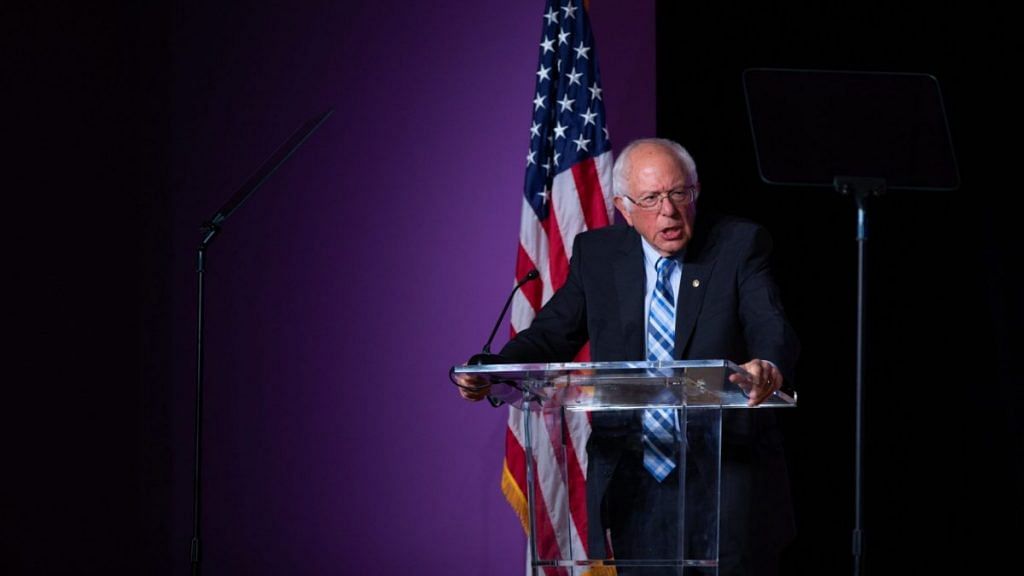As Donald Trump left India after a largely unsuccessful visit last week, Senator Bernie Sanders, the front-runner for the Democratic nomination, expressed himself on the subject with his accustomed vehemence. “Instead of selling $3 billion in weapons to enrich Raytheon, Boeing and Lockheed, the United States should be partnering with India to fight climate change,” he tweeted. Sanders added: “We can work together to cut air pollution, create good renewable energy jobs, and save our planet.”
Two parts of this tweet deserve attention. We can dispose of the first quickly: By the standards of international defense deals, $3 billion is not a lot, and the U.S. defense industry continues to view India as a missed opportunity. Sanders is turning a fairly low-key sale into something that looks like an unusual, and personal, achievement for Trump.
The second and more worrying point is about “partnering with India to fight climate change.” This is a wonderfully warm and fuzzy sentiment. Yet there’s nothing in Sanders’s platform to back it up — in fact, quite the reverse.
Sanders’s climate change plan is the most financially ambitious of any of the Democratic candidates. It devotes $16.3 trillion to reshaping the American economy through what the party’s left has come to call a “green New Deal.” That money would be spent on new and renewable energy ($2.5 trillion); energy efficiency subsidies for households and small businesses ($2 trillion); and so on. And, certainly, a reduction in U.S. emissions is vital if we are to keep global temperature rises under control.
But the fact is that, if countries like India proceed on a carbon-intensive development path, those efforts would be moot. Any “partnership” with India to address climate change would have to ensure that Indian governments and companies have the finance and technology to build out infrastructure and industries that don’t triple or quadruple their carbon emissions per capita. (Currently, they don’t have access to either the money or the tech.)
Also read: India’s Bernie Sanders will be a raging capitalist
Does Sanders really want to address that problem? The numbers are stark: Out of the $16.3 trillion he promises for climate change, a mere $200 billion is to go to the Green Climate Fund for developing countries. That’s a tiny fraction (1.2%) of the $90 trillion that the world is expected to invest in infrastructure over the next decade—money that won’t go toward low-carbon, energy-efficient projects without significant steering and incentives. Sanders’s shortchanging of that effort is a reminder that real “partnerships” with countries like India are the last thing on his mind.
India and much of Africa will only be set on a low-carbon development path if they have the resources to do so. And the West, and specifically Westerners’ savings, is the only hope for those resources. Clearly, rich-country governments will balk at scooping up these savings and sending them abroad; so we have to incentivize the private sector to do so instead. This could work, especially as the returns on green infrastructure in the emerging world can be quite attractive if properly packaged.
Yet Sanders and other proponents of “Green New Deals” want to do the opposite. They want to put those savings to work at home, creating domestic jobs rather than solving the global problem of climate change. To do this they will restrict financial flows if necessary — and, in Sanders’ case, vastly expand the amount of U.S. income and investment controlled by the government. Their concern isn’t really the environment — it is, of course, domestic inequality. The climate crisis is merely a handy excuse for reshaping the economy. Which would be fine, if not for the fact that it’s also, well, a crisis. Greta Thunberg warned about exactly this in her speech to U.S. lawmakers last year: “Of course a sustainable transformed world will include lots of new benefits. But you have to understand. This is not primarily an opportunity to create new green jobs, new businesses or green economic growth. This is above all an emergency, and not just any emergency. This is the biggest crisis humanity has ever faced.”
Forcing U.S. savings and profits to stay home instead of putting them to work in the developing world is bad for the environment — and pretty immoral as well if you actually care about inequality, since the U.S. is one of the richest places on earth, the global equivalent of the “one percent.” Donald Trump has been a disaster for the fight against global warming. But Bernie Sanders cannot credibly claim to be a climate warrior, either. When it comes to the environment, as with trade and development, he would mostly leave the rest of the world to struggle alone. So please, just spare us the sanctimonious tweets about weapons and “partnership.”
Also read: Why age doesn’t matter for Trump, Sanders, Bloomberg, Biden
